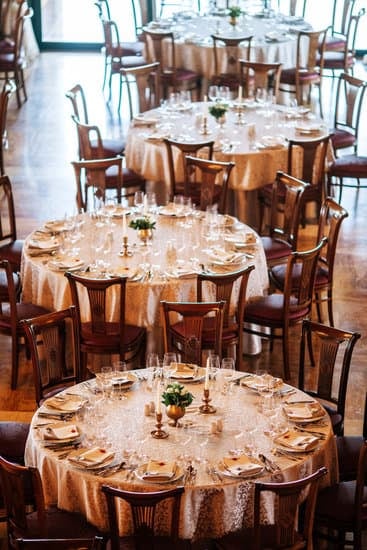Are you wondering how long before a wedding should RSVPs be returned? RSVPs, or répondez s’il vous plaît, are a critical aspect of wedding planning. They provide the soon-to-be-wed couple with an accurate headcount for their special day. In this article, we will delve into the necessity of RSVPs and offer tips on setting a deadline for receiving responses from guests.
Understanding the importance of RSVPs is essential in ensuring that your wedding celebration runs smoothly. From determining the amount of food and drinks to finalizing seating arrangements, timely and accurate replies from your guests are crucial. Without a clear understanding of when responses are expected, couples may find themselves facing unnecessary stress and uncertainty as their big day approaches.
In this section, we will explore why RSVPs are a vital component of wedding planning, providing insights into how they can impact various aspects of the celebration. We will also discuss the significance of setting an appropriate deadline for receiving RSVPs to ensure that everything from catering to venue arrangements can be executed seamlessly. Stay tuned for valuable advice on navigating the intricacies of managing responses for your upcoming nuptials.
Understanding RSVPs
Essentially, an RSVP is a response from the invited guest indicating whether or not they will be able to attend the event. This simple yet important gesture allows couples to plan and make arrangements accordingly, such as finalizing the guest list, seating arrangements, catering requirements, and more.
It’s necessary to establish a deadline for receiving RSVPs in order to give ample time to organize and plan for the event. Typically, guests are given several weeks before the wedding date to respond.
This timeframe allows for any unforeseen circumstances that may affect their attendance, ensuring that the couple has an accurate count of who will be present on their special day. Moreover, setting an RSVP date also helps in streamlining communication between the couple and their guests regarding logistical details and updates related to the wedding.
In addition to providing logistical benefits, RSVPs also play a significant role in demonstrating consideration and respect towards the couple getting married. By responding promptly and adhering to the designated deadline, guests can help alleviate stress and allow the couple to focus on creating unforgettable memories during their celebration. Therefore, understanding what RSVPs are and why they are necessary for a wedding is essential in promoting smooth coordination and enhancing everyone’s overall experience.
Setting the RSVP Date
When planning a wedding, one of the most critical details to consider is the RSVP date. The RSVP date is the deadline by which guests are expected to respond to the wedding invitation. Setting a clear and reasonable RSVP date is crucial for making necessary arrangements such as finalizing guest counts, seating charts, and catering orders. Here are some helpful tips on how to determine the deadline for receiving RSVPs.
Factors to Consider
When setting the RSVP date, it’s essential to take various factors into account. The first factor to consider is your venue’s policy or contract requirements. Many venues require a final headcount several weeks before the wedding date, so be sure to check with your venue coordinator for any specific deadlines.
Additionally, consider when your caterer or food service provider needs a final count and any other vendors who require advance notice. Another important consideration is coordinating with your invitation mailing timeline to allow guests sufficient time to respond.
Give Ample Time
It’s crucial to give guests enough time to respond before the RSVP deadline. Typically, invitations are sent out 6-8 weeks before the wedding date, so setting the RSVP deadline around 2-4 weeks before the event allows guests ample time for consideration and response. This also provides you with enough time for follow-ups with any non-responding guests.
Consider Travel Needs
If you have many out-of-town guests attending your wedding, it’s courteous to set an earlier RSVP deadline. This allows them ample time to make travel arrangements and ensures that they can secure accommodations and transportation well in advance. Considering your guests’ travel needs demonstrates thoughtfulness and consideration on your part as hosts of the event.
Communication
When it comes to planning a wedding, one of the most important aspects is knowing how many guests will be in attendance. This is where RSVPs come in. RSVP, which stands for “Répondez s’il vous plaît” in French, translates to “Please respond” in English.
It is a way for the couple getting married to know who will be attending their special day and make necessary arrangements. So, how long before a wedding should RSVPs be returned? The general rule of thumb is to set the RSVP deadline for about 3-4 weeks before the wedding date.
There are several ways to effectively communicate the RSVP date to your guests. Here are some tips on how to ensure that your guests are aware of the deadline for responding:
- Include the RSVP date on the invitation itself: One of the simplest ways to communicate the deadline is by including it on the wedding invitation.
- Utilize electronic invitations: If you’re sending out digital invitations, you can set up automatic reminders for guests to RSVP by a certain date.
- Create a wedding website: Having a dedicated wedding website allows you to provide all relevant details, including the RSVP deadline, and easily update any information as needed.
By ensuring that your guests are informed about when they need to respond by, you can better plan for your big day and make sure that everything goes smoothly. Effective communication regarding the RSVP date also sets expectations for your guests and encourages them to respond in a timely manner.
Consequences of Late RSVPs
The process of planning a wedding can be both exciting and stressful, with many details to consider and decisions to make. One crucial aspect of wedding planning is receiving timely responses from guests regarding their attendance. Late RSVPs can have significant consequences for the couple and their wedding preparations.
One consequence of late RSVPs is the challenge it presents in finalizing seating arrangements and catering plans. Couples often need to provide a final guest count to their venue and caterer several weeks before the wedding date. When guests fail to RSVP by the requested deadline, it can make it difficult for the couple to accurately plan for the event, leading to potential logistical issues on the day of the wedding.
Furthermore, delayed responses can also impact the couple’s budget. The number of guests attending directly affects various expenses such as catering, favors, and seating arrangements. Without an accurate headcount, couples may end up overpaying for services or not having enough resources for all attendees if they receive late RSVPs.
Lastly, late RSVPs may also cause stress and anxiety for couples as they try to manage last-minute changes and adjustments. This added pressure can take away from what should be a joyous time leading up to the wedding day.
| Consequences of Late RSVPs | Impact |
|---|---|
| Challenge in finalizing seating arrangements and catering plans | Difficulty in accurately planning for the event leading to potential logistical issues |
| Impact on the couple’s budget | Inaccurate headcount affecting expenses such as catering, favors, and seating arrangements |
| Stress and anxiety for couples | Last-minute changes and adjustments taking away from a joyous time leading up to the wedding day. |
Etiquette
When it comes to responding to a wedding invitation, proper etiquette is key. One of the most important aspects of this is adhering to the requested deadline for RSVPs. The couple getting married and their wedding planner need an accurate headcount in order to finalize details such as seating arrangements, catering, and more. That’s why it’s crucial for guests to respond in a timely manner.
So, how long before a wedding should RSVPs be returned? Typically, couples will set an RSVP deadline that falls anywhere from 3 to 4 weeks before the wedding date. This gives them enough time to make all necessary arrangements based on the number of guests attending. In some cases, particularly for destination weddings or if there are other factors that require extensive planning such as custom favors or personalized elements, the RSVP date may be even further in advance.
It’s important for guests to understand that failing to respond by the indicated date can cause unnecessary stress for the couple and may lead to extra expenses incurred due to last-minute changes. By adhering to the specified deadline for RSVPs, guests can demonstrate consideration and respect towards the soon-to-be-married couple and contribute positively to the overall success of their special day.
| Topic | Data |
|---|---|
| RSVP Deadline | 3-4 weeks before the wedding date |
| Exceptional Cases | Possibly further in advance |
Follow-Up
Planning a wedding can be a stressful and overwhelming process, and one of the most crucial aspects is receiving RSVPs from guests. It’s important to know how many people will be attending in order to finalize details such as seating arrangements, catering, and other accommodations. However, not all guests respond in a timely manner, leaving the couple to wonder who will or won’t be present on their special day.
So, how long before a wedding should RSVPs be returned? While traditional etiquette suggests setting the RSVP date 2-3 weeks before the wedding date, modern couples may find it helpful to set an earlier deadline. This allows for extra time to follow up with guests who have not yet responded and still gives enough time to finalize arrangements. Ultimately, it’s up to the couple to decide what works best for them and their specific event.
Following up with guests who have not yet RSVP’d can be done in a polite and gentle manner. One approach is sending a friendly reminder via email or text message, kindly asking guests to RSVP by the specified deadline if they haven’t already done so.
Another option is making personal phone calls to those who have not responded. It’s important to remember that some guests may simply forget or overlook the invitation, so reaching out in a courteous way can yield positive results without causing any unnecessary stress or tension.
Final Guest Count
When it comes to planning a wedding, finalizing the guest count is an essential step in ensuring that all arrangements are in place for the big day. The RSVP deadline plays a crucial role in this process, as it gives the couple and their vendors a clear idea of how many guests to expect. Without an accurate headcount, important decisions regarding seating, catering, and other logistical details cannot be made effectively.
Importance of the RSVP Deadline
The RSVP deadline serves as a cutoff date for guests to respond to the wedding invitation. This date is typically set by the couple based on various factors such as venue requirements, catering needs, and overall event planning timeline. It is important for guests to adhere to this date so that the couple can proceed with making final arrangements for their special day.
Setting a clear RSVP deadline helps alleviate stress for both the couple and their vendors. Without a firm guest count, there is always uncertainty surrounding meal planning, seating assignments, and other logistical aspects of the wedding. By sticking to the RSVP deadline, couples are able to provide their vendors with accurate numbers and ensure that everything runs smoothly on the day of their celebration.
Finalizing Wedding Arrangements
Once the RSVP deadline has passed, couples are able to finalize their wedding arrangements with confidence. They can provide their caterers with an accurate headcount for meals, create seating charts based on confirmed attendees, and make any necessary adjustments to their plans based on the number of guests who will be present. This level of clarity allows for a more seamless and enjoyable wedding experience for everyone involved.
Conclusion
In conclusion, it is clear that RSVPs play a crucial role in the success of a wedding celebration. Understanding what RSVPs are and why they are necessary for a wedding is essential for both the couple and their guests. Setting a firm RSVP date, communicating it effectively to guests, and following proper etiquette when responding to an invitation are all key elements in ensuring the planning process runs smoothly.
The consequences of late RSVPs can have a significant impact on the couple’s ability to finalize important arrangements such as catering, seating plans, and even the overall budget. It is important for guests to understand that their timely responses are not only appreciated but also necessary for the couple to plan a memorable event.
Overall, a successful wedding celebration heavily relies on guests’ cooperation in promptly returning their RSVPs. By understanding the significance of timely responses and adhering to proper etiquette, both couples and their guests can contribute to making the wedding planning process as stress-free as possible. So, remember: when in doubt about how long before a wedding should rsvps be returned, always aim for an early response to show your support and excitement for the upcoming celebration.
Frequently Asked Questions
When Should You Get RSVPs Back for a Wedding?
It is standard to request RSVPs back for a wedding about 3-4 weeks before the event. This allows enough time to finalize catering numbers, seating arrangements, and other logistical details.
When Should You Remind Guests to RSVP?
It’s a good idea to remind guests to RSVP about 1-2 weeks before the deadline. A gentle nudge via email, phone call, or even a friendly reminder on social media can help ensure that you have an accurate headcount for your wedding.
Is 3 Months Too Early to Send Out Wedding Invitations?
Three months before the wedding is not too early to send out invitations. In fact, this timeframe is quite common and gives guests ample time to plan their schedules, make travel arrangements, and RSVP in a timely manner. Sending them out early can also be considerate for out-of-town guests who may need to make arrangements well in advance.

I have been involved in marriages for over 20 years helping couples and singles understand more about them.





